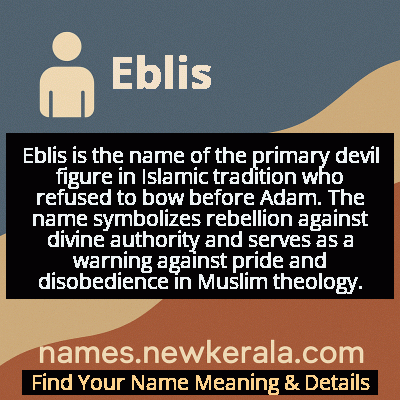Eblis Name Meaning & Details
Origin, Popularity, Numerology Analysis & Name Meaning of Eblis
Discover the origin, meaning, and cultural significance of the name EBLIS. Delve into its historical roots and explore the lasting impact it has had on communities and traditions.
Name
Eblis
Gender
Male
Origin
Muslim
Lucky Number
2
Meaning of the Name - Eblis
Eblis is the name of the primary devil figure in Islamic tradition who refused to bow before Adam. The name symbolizes rebellion against divine authority and serves as a warning against pride and disobedience in Muslim theology.
Eblis - Complete Numerology Analysis
Your Numerology Number
Based on Pythagorean Numerology System
Ruling Planet
Moon
Positive Nature
Diplomatic, friendly, artistic, empathetic.
Negative Traits
Over-sensitive, moody, indecisive, prone to self-pity.
Lucky Colours
Green, cream, white.
Lucky Days
Monday.
Lucky Stones
Pearl, moonstone.
Harmony Numbers
1, 3, 4.
Best Suited Professions
Diplomats, mediators, caregivers, artists.
What People Like About You
Cooperative spirit, friendliness, artistic talent.
Famous People Named Eblis
Eblis (Mythological)
Religious Figure
Primary devil figure in Islam who refused God's command to bow before Adam
Eblis al-Jahannami
Scholar
Noted Islamic scholar who wrote extensively about jinn and spiritual beings
Eblis Khan
Military Leader
Central Asian military commander known for his strategic campaigns
Name Variations & International Equivalents
Click on blue names to explore their detailed meanings. Gray names with will be available soon.
Cultural & Historical Significance
Extended Personality Analysis
Individuals named Eblis are often perceived as possessing strong willpower, independence, and intellectual depth, though these qualities may manifest as stubbornness or rebellious tendencies. They typically exhibit charismatic leadership qualities and natural confidence, but may struggle with authority structures and conventional expectations. The name carries an inherent complexity, suggesting someone who questions established norms and pursues their own path with determination. These individuals often demonstrate sharp analytical skills and persuasive abilities, making them effective in debates and intellectual pursuits. However, the mythological associations may also imply a tendency toward pride or challenging traditional boundaries, requiring conscious balance between independence and social harmony. In social contexts, people with this name often display intense loyalty to their chosen causes and may exhibit a philosophical or contemplative nature, frequently engaging with deep questions about morality, authority, and personal integrity.
Modern Usage & Popularity
In contemporary times, the name Eblis remains relatively rare and carries significant religious weight, making it an unconventional choice for Muslim families. Its usage is primarily confined to regions with deep Islamic scholarly traditions, particularly in parts of South Asia and the Middle East where classical religious names maintain cultural relevance. The name's strong association with the Islamic devil figure makes it controversial for many parents, though some choose it for its historical significance or as a reminder of theological lessons about pride and obedience. In recent years, there has been minimal change in its popularity, with it remaining a niche choice among families with particular interest in Islamic eschatology or those appreciating its phonetic qualities separate from religious connotations. The name occasionally appears in academic contexts or among families with specific theological interests, but generally avoids mainstream usage due to its powerful religious symbolism.
Symbolic & Spiritual Meanings
Symbolically, Eblis represents the ultimate consequence of pride and disobedience in Islamic cosmology, serving as a perpetual warning against challenging divine authority. Metaphorically, he embodies the tension between free will and submission, knowledge and arrogance, and the fine line between righteous independence and destructive rebellion. In Sufi interpretations, Eblis symbolizes excessive love that leads to separation from the Divine, representing the soul that chooses its own understanding over divine command. The name carries layers of meaning about the nature of temptation, the psychology of rebellion, and the philosophical questions surrounding predestination and moral choice in Islamic thought. Eblis also symbolizes the tragic figure who possessed knowledge and proximity to God but allowed pride to corrupt his position, making him an enduring symbol of wasted potential and the dangers of spiritual arrogance.

